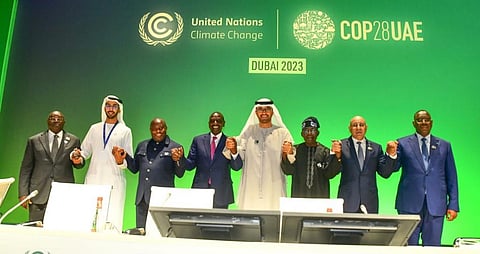

African leaders came together on the third day of the 28th Conference of Parties (COP28) to the United Nations Framework Convention on Climate Change to launch the green industrialisation of the continent.
The Green Industrialisation Initiative is set to accelerate green growth of industries in Africa and attract finance and investment opportunities, building upon the Nairobi Declaration of the Africa Climate Summit held in September 2023.
Kenya’s President William Ruto launched the initiative, stressing on the tremendous potential of the continent in key areas of green growth. He highlighted the fact that Africa has 40 per cent of the world’s critical minerals necessary for energy transition and has the world’s largest natural carbon sink.
He further encouraged the rest of the world to look at Africa as a land of opportunities to engage in business, underlining the continent’s potential of exporting green steel through reserves of iron ore and production of green hydrogen, huge bauxite reserves for green aluminium and renewables assets in the Sahel region.
The initiative builds upon the existing $4.5 billion Africa green investment from the United Arab Emirates (UAE) that COP28 President Sultan Al Jaber announced during the Africa Climate Summit.
More than 10 heads of state from Africa; UAE President Sheikh Mohamed bin Zayed al Nahyan; Sultan Al Jaber and UN Climate Change High Level Champion for Egypt Mahmoud Mohieldin were key leaders present in the conference.
The inaugural by Ruto was followed by a panel discussion consisting of leaders from five African countries. It was moderated by IHLEG co-chair Vera Songwe. The five presidents — from Nigeria, Ivory Coast, Mauritania, Zambia and Djibouti — discussed the continent’s priorities for transition of industries.
Mauritanian President Mohamed Ould Ghazouani stressed that developing nations are currently in a transition phase and need to take advantage of their energy resources for energy security and development while also preparing for transition.
He added that Mauritania has substantial gas resources and unique solar and wind potential in its northwestern region. Ghazouani further noted that the country expects to develop green hydrogen and green ammonia for export and local use by 2030.
“As the African continent prepares to stride towards green industrial growth to emerge as a global supplier of green energy and resources, it is essential that all partnerships with the rest of the world need to be just and equitable and should benefit African countries and their people,” said Parth Kumar, programme manager of Delhi-based Centre for Science and Environment’s Industrial Unit.
There is also a need to de-risk and develop a long-term basis plan for green industrialisation as underpinned by Nigerian President Bola Ahmed Tinubu.
Ismail Omar, the leader of Djibouti, said Africa aspires for 100 per cent green energy. Djibouti has favourable wind energy potential owing to its location at the confluence of the Indian Ocean and the Red Sea, he added.
Zambian President Hakainde Hichilema seconded Ruto that green industrialisation is the way forward and that African leaders need to work towards a pool of resources that must be available to the entire continent.
Lastly, the president of Ivory Coast talked about maintaining climate health for the entire world.
“We are forging a green pathway for Africa. We have set in motion a virtuous cycle, fostering sustainable economic growth,” said Senegalese President Macky Sall, who was also present at the event.